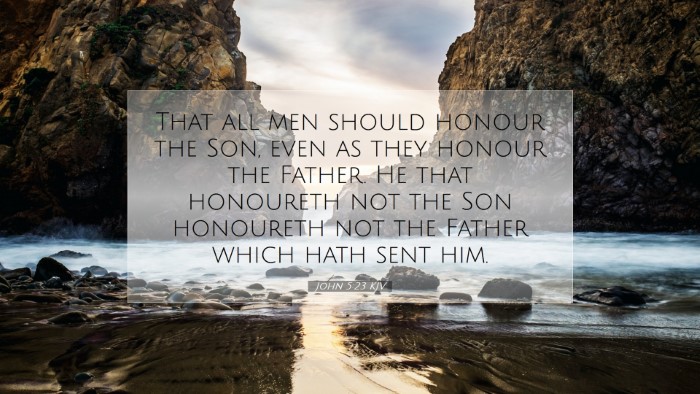Commentary on John 5:23
Verse: "That all men should honor the Son, even as they honor the Father. He that honoreth not the Son honoreth not the Father which hath sent him." (John 5:23, KJV)
Introduction
This verse is pivotal in understanding the relationship between the Father and the Son within the Christian doctrine of the Trinity. It invites us into a deep examination of Christ's divinity and authority, and it highlights the necessity of honoring both the Father and the Son within the life of the believer.
The Significance of Honor
Matthew Henry's Commentary: Honor in biblical terms signifies respect, reverence, and exaltation. To honor the Son means to recognize His divine nature and function; it is an acknowledgment of His equal standing with the Father. Henry emphasizes that the term 'honor' extends beyond mere acknowledgment; it entails obedience and reverence in daily living. Therefore, when we consider the implications of this verse, we understand that to honor Christ is to live in a manner that uplifts His lordship in our lives.
Adam Clarke's Insights: Clarke elaborates that the equality of honor between the Son and the Father points to the co-essential nature of the Godhead. He notes that the Jews, in their fervent worship of God, often failed to recognize the full revelation of God in Jesus Christ. Clarke underscores that this lack of understanding would lead to a dishonoring of both the Son and the Father, as true worship can only occur when we comprehend the complete nature of God as revealed through Christ.
Theological Implications
- Christ’s Divine Authority:
Barnes explains that this verse affirms the Son's divine authority and His role in the redemptive plan. The passage indicates that the honor due to the Father must also be extended to the Son, thus establishing Jesus as central to Christian faith and worship.
- The Relationship Between the Father and the Son:
Henry articulates that the Father and Son share an inseparable relationship. Their mutual honor is a reflection of their unity in essence and purpose. This underlines the truth that recognizing one without the other leads to an incomplete understanding of God.
- Response of Humanity:
Clarke brings to light that the requirement to honor the Son also carries an implication for humanity. It indicates that the rejection of Christ results in the dishonor of the Father. Therefore, a relationship with God is inherently tied to one's response to Christ.
Practical Applications
For pastors and theologians, John 5:23 serves as a profound reminder of the centrality of Christ in preaching and liturgical practice. The call to honor the Son challenges congregants to evaluate the nature of their worship and personal relationship with Christ.
- Worship and Liturgical Focus:
Church services should reflect an equal honor to the Father and the Son. This challenges pastors to incorporate Christocentric elements within worship, where the exaltation of Jesus is not an afterthought but the primary focus.
- Discipleship and Teaching:
For teachers and leaders, this scripture demands a commitment to teaching about the nature and deity of Christ. Discipleship must encompass a holistic understanding of who Christ is and His role in the divine plan, emphasizing that knowing Christ is essential to knowing God.
- Evangelism:
In evangelistic efforts, recognizing that the honor of the Father comes through the Son is crucial. Communicating the gospel must include the full revelation of Jesus as the way to encounter and experience the Father.
Conclusion
John 5:23 stands as a clarion call for all believers, calling us to honor Christ in all aspects of our faith. The insights from Matthew Henry, Adam Clarke, and Albert Barnes together underscore the profound mystery of the relationship between the Father and the Son. For theologians, students, and pastors, this verse challenges and inspires us to delve deeper into Christ's significance in our worship, understanding, and living out our faith.


